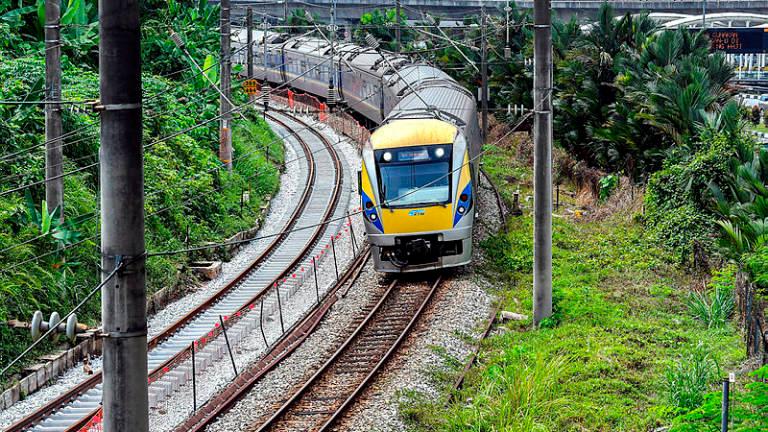KUALA LUMPUR: Keretapi Tanah Melayu Bhd (KTMB) must develop logistics schemes such as door-to-door (D2D) or just-in-time (JIT) cargo delivery services to remain competitive in the future.
Mohd Shahriman Shafein, the director-general of rail at the Ministry of Transport (MOT), said rail operators should partner with a combination of multiple modes so as to compete against road transport.
“The move would enable Malaysia to compete as a regional freight hub in line with the National Transport Policy (NTP),” he said.
Since trains seldom provide D2D services, more should be done to develop intermodal transport, Mohd Shahriman said in a statement issued during a recent programme on management and technical expertise for KTMB operations personnel conducted by experts from Japan Freight Railway Company (JR Freight).
He said KTMB, as Malaysia’s largest railway company, should partner with road hauliers, port operators, freight forwarders, intermodal terminal operators, as well as third-party logistics companies, as together, they could provide seamless delivery services required by changing supply chains.
“This entails a combination where trucks or vans perform the first and the last mile of a railway journey,” he said.
Mohd Shahriman said infrastructure capacities, railway competitiveness, cost-efficiency and productivity must be improved to achieve this change, with efficient human resource capital a key element to improving multi-modal cargo services.
He said this was why training from JR Freight would provide the necessary knowledge to prepare KTMB personnel for the changes in logistics.
“This also entails KTMB planning and investing in extensive automation, digitisation of the rail freight sector and implementing new strategies to provide agile delivery service,” he said.
On its part, he said MOT would continue to provide focus and direction by creating a conducive ecosystem to facilitate the seamless movement of goods and passengers and bring down the cost of doing business.
Mohd Shahriman said interconnectivity among various modes of transport in moving cargo would help Malaysia realise its target as a Regional Distribution Hub.
“This is in line with the NTP, which aims to propel Malaysia in its logistic endeavours with enhancements and interconnectivity among the road, rail, air and maritime sectors,” he said.
JR Freight, during the programme, had proposed that Ipoh and Nilai should be used as the transport base between Malaysia and Thailand and Laos and China and that domestic freight stations be constructed around the Kuala Lumpur urban area for getting domestic demand.
Shift towards larger, centralised hubs
Mohd Shahriman said as a rail operator, KTMB should take cognisance of the global trend in logistics, especially towards growth in mega container ships, which has resulted in the formation of strategic alliances between carriers.
“In the process, it spreads the risk associated with new investments and better use of existing capacity,” he said.
He said another emerging trend is a further move towards containerisation, whereby in a decade, 90 per cent of the general cargo segment, such as steel and forest products, as well as break bulk cargo, such as malt and fertilisers, will be put in containers.
“These trends indicate a shift towards larger, more centralised hubs,” he said.
As such, Mohd Shahriman said Malaysia should, in the future, be able to compete as a regional freight hub with the necessary development of rail infrastructure, regulations and service providers.
He cited challenges whereby additional transhipment and pre- and end-haulage operations often result in higher door-to-door costs and longer lead times compared with direct trucking.
“This additional handling also affects customers’ logistics costs, level of service, or both,” he said.
Therefore, Mohd Shahriman said KTMB has the daunting task of easing the challenge by partnering with various providers to set up an efficient and seamless multi-modal freight transport service.
“The services have to be cost-competitive and attractive to shippers, especially if customer requirements can be met without their recognising that the transport chain may involve various combinations of road, rail, and inland waterways,” he added. –Bernama
Reference: https://www.thesundaily.my/home/ktmb-must-develop-d2d-services-to-remain-competitive-in-cargo-delivery-PH10717998

